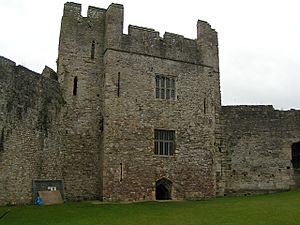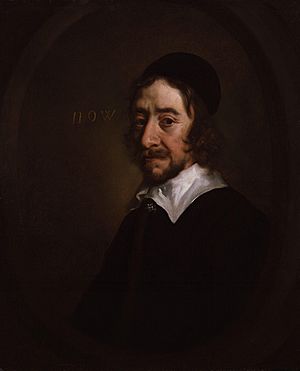Henry Marten (regicide) facts for kids
Henry Marten (born 1602 – died 9 September 1680) was an English lawyer and politician. He served as a Member of Parliament in the House of Commons during the 1640s and early 1650s. Marten was a strong supporter of a republic, meaning he believed England should be governed by elected representatives, not a king. He was also one of the people who signed the death warrant for King Charles I of England.
Contents
Early Life and Education
Henry Marten was born in Oxford, England, in 1602. His father, Sir Henry Marten, was a successful lawyer and diplomat. Henry went to Oxford University, graduating in 1620. Like many young men from wealthy families, he also studied law. In the 1620s, he traveled around Europe. During his time in France, he learned about new philosophical ideas.
Political Career
Marten first became known in 1639 when he refused to contribute to a special loan requested by the king. In April 1640, he was elected as a Member of Parliament for Berkshire. He was re-elected for the Long Parliament in November 1640. While he had homes in Shrivenham and Longworth, he preferred to live in London.
In Parliament, Marten joined a group that wanted more power for the people. He spoke out against King Charles. His words were so direct that the King even demanded his arrest for treason.
Role in the English Civil War
When the English Civil War began, Marten was very active in Parliament. He was appointed governor of Reading, Berkshire. On one occasion, his strong support for Parliament led him to open a private letter from the Earl of Northumberland to his wife. For this, the Earl hit him.
In 1643, Marten was briefly sent to the Tower of London. This happened because he openly said that the royal family should be removed and that monarchy should end.
However, in 1644, he was made governor of Aylesbury and took part in the war directly. He was allowed to return to Parliament in January 1646. Marten continued to support extreme republican ideas. He spoke about preparing the king for heaven, meaning he wanted to remove the king from power. He also supported the New Model Army against Parliament.
King Charles I's Trial
Henry Marten worked with Oliver Cromwell to bring King Charles I to trial. He was one of the most important of the 59 Commissioners who signed the king's death warrant in 1649. After the king's execution, Marten worked hard to establish the Commonwealth, which was a republic without a king. He helped remove the last parts of the old monarchy.
He was chosen as a member of the Council of State in 1649. He received lands worth £1000 a year as a reward for his services during the war. He spoke often in Parliament, but he did not take part in public life during the Protectorate, the period when Oliver Cromwell ruled. During this time, he was even imprisoned because of his debts.
Imprisonment and Death
After the monarchy was restored in 1660, Marten surrendered to the authorities. He was one of the people who were not forgiven for their role in the king's death. He acted bravely at his trial in October 1660 and was found guilty of taking part in the king's death. However, he was spared the death penalty and remained a prisoner.

Marten was sent to different prisons. In 1668, he was moved to Chepstow in Wales. His imprisonment there lasted about twelve years. He had a suite of rooms in what is now known as Marten's Tower. He was even able to travel outside sometimes. Henry Marten died at Chepstow Castle on 9 September 1680. He choked while eating his supper. He was buried in the Priory and Parish Church of St Mary in Chepstow.
Beliefs and Personality
Henry Marten was known for enjoying life. He was a strong supporter of freedom of worship and conscience. His political views were always consistent: he was against one-man rule and believed in government by elected representatives. In 1643, even when Parliament was winning the First Civil War, Marten's republican beliefs led to his arrest and brief imprisonment.
For his time, Marten was unusual because he openly wanted to replace the monarchy with a republic, rather than just reforming it.
Writings
Henry Marten did not write many books, often starting works but not finishing them. However, he did write and publish several pamphlets on political topics:
- A Corrector of the Answerer to the Speech out of Doores (1646)
- An Unhappie Game at Scotch and English (1646)
- The Independency of England Endeavoured to be Maintained (1648)
- The Parliaments Proceedings Justified in Declining a Personall Treaty (1648)
In 1662, a collection of his letters, called Henry Marten's Familiar Letters to his Lady of Delight, was published without his permission.
 | William M. Jackson |
 | Juan E. Gilbert |
 | Neil deGrasse Tyson |


